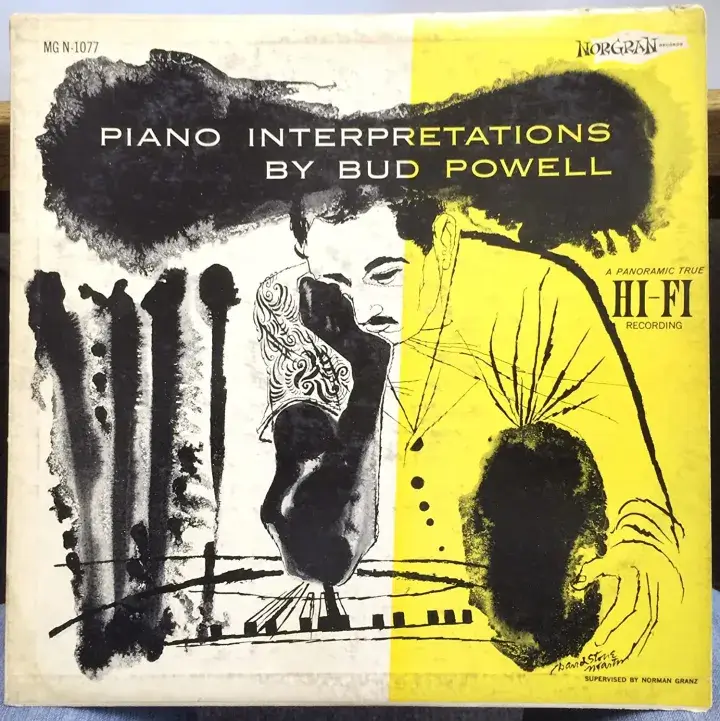By the time you read this, Bud Powell’s 100th birthday (September 27) will have passed, with a 24-hour broadcast from WKCR and a 25% discount promotion from Blue Note records on the two Powell LPs on their label currently in print. So after blowing out the candles, let’s take a look at how that is a tragedy.
Powell was the first and greatest bebop pianist. He was overshadowed by his contemporary Thelonious Monk, who was promoted as the “High Priest of Bebop” even though he wasn’t a bop player. Monk was the Stravinsky of jazz piano, not only reviving stride and swing through a modernist sensibility, but using rhythm and meter as the foundation of his composing, getting endless mileage out of taking simple, discrete ideas and shifting them around through time. Powell on the other hand was an absolute bopper, his right hand spinning out twisting, self-perpetuating lines like those of a horn player, adding the melodic curlicues and rhythmic accents that were essential to the bop vernacular that Charlie Parker and Dizzy Gillespie created. Powell was in and of the idiom. Like those two, he revolutionized ideas they all had picked up from the great swing musicians.
Even though he’s the pianist on the Parker-Gillespie Jazz at Massey Hall album, famously called the “greatest jazz concert ever,” Powell has run a distant second to Monk in the public mind. Among musicians, his stature and influence have always been prominent (and not just in jazz; the great French classical pianist Samson François was a huge Powell fan, and you can hear that influence in the way François played Chopin, with a lean manner that emphasized the top lines in the music), but Powell has never been more than a marginal figure for the greater jazz public. That his albums have not been consistently in print is a huge part of that, and is a tragedy that compounds that of Powell’s own life. He died in 1966 at the age of 41, having endured decades of severe mental illness with roots in a serious beating at the hands of the police and compounded by electroconvulsive therapy (Bertrand Tavernier’s 1986 film Round Midnight, starring tenor saxophonist Dexter Gordon, was based in large part on Powell’s life as an expatriate in France).
The one Powell album to have if you can have only one is Bud Plays Bird, a piano trio date with bassist George Duvivier and drummer Art Taylor. Recorded across late 1957 and early 1958, Powell runs through tunes like “Yardbird Suite,” “Ornithology,” and “Moose the Mooche” with high spirits, intelligence, elegance, and plenty of fire. But don’t look for it; the tapes sat in a vault until discovered by Michael Cuscuna and released on CD by Blue Note in 1997, whereafter it was left to go out of print.
Currently in print are The Amazing Bud Powell Vol 1 and Time Waits, both on Blue Note. The invaluable CD collections The Complete Blue Note and Roost Recordings and The Complete Bud Powell on Verve, which between them have his greatest sessions (except for Bud Plays Bird which came out the year after the Blue Note collection was released)—the latter with his fantastic solo album Bud Powell’s Moods (also issued as The Genius of Bud Powell)—are out of print and have been for decades.
To be absolutely specific, the albums on these collections can be found in cheap knock-off sets from Europe, where they are no longer under copyright and can be reissued by anyone who wants to produce them. So the music is out on the general market, but keep in mind that labels like Chrome Dreams and Reel to Reel do not have the original tapes, these are copied off of previous reissues, likely ripped and repackaged CDs. Caveat emptor.
Does Bud live? If an artist has no records available to be heard, does he make a sound? The tragedy of Powell’s life is compounded by the tragic indifference of the record companies to his musical legacy, which is one of the greatest and most important in the history of jazz, itself one of the greatest and most important facets of American culture. Jazz is neither owned nor controlled by the musicians, though, in this case it’s in the hands of the capitalists who run the Universal Music Group, which owns both Blue Note and Verve, and UMG is not even an American corporation. American aesthetic culture—music, literature, painting—is subservient to American social culture, which is organized around worship of the almighty dollar, this is the fundamental divide. For writing, the fine arts, even film, there are institutions that ameliorate this and preserve the things that will matter more in hundreds of years than who was the richest person at any given time. Why can’t we have the same thing for jazz?
The model I look to is the Library of America, a nonprofit publisher that keeps important American writing in print. Their catalogue is constantly expanding, and it stretches from the 17th to the 21st century. The editions are carefully edited and authoritative, printed on acid-free paper so they last, and most importantly once they are in print they remain in print. That’s the point, to preserve American literary culture, from early poetry to Herman Melville, Jane Bowles to Albert Murray, Henry James to Don DeLillo.
DeLillo is an example of how Library of America works. In two volumes, they’ve republished The Names, White Noise, Libra, Mao II, and Underworld, even as each of these remains currently in print from their for-profit publishers. This is a living author, still writing, still selling books; eventually his publishers (Vintage, Penguin, and Scribner) will stop selling the books, at least temporarily, but they will never go out of print or be unavailable.
If this is possible with a living writer, conceptually it is possible with the catalogues of dead jazz musicians. And it should be possible. DeLillo is indisputably important to American culture, and so is Powell (and Monk and Parker and Gillespie, and how about Duke Ellington and his complete RCA Victor recordings, another collection that has disappeared?). There’s a lot of lip service that comes out of prestigious American institutions like Lincoln Center and PBS about how jazz is essential to America. The idea is right, but it doesn’t appear to be true, because jazz has been left in the hands of giant corporations like UMG where profit and loss are the only things that matter in the end.
Jazz needs this, but jazz also deserves it. Bud Powell deserves it, and people who listen to and care about jazz deserve to be able to hear him (and no, Spotify is not a reasonable option because it exists to enrich executives and there’s no guarantee the music will always be available). For something as important and also economically marginal as jazz, the non-profit music library is the ideal institution, a place that preserves one of the most important parts of America and keeps it available, in perpetuity, for everyone. Surely, we can do this.
Author
-

George Grella wrote the book on Miles Davis’ Bitches Brew. He write other stuff too. killyridols.substack.com/
View all posts
George Grella wrote the book on Miles Davis’ Bitches Brew. He write other stuff too. killyridols.substack.com/










